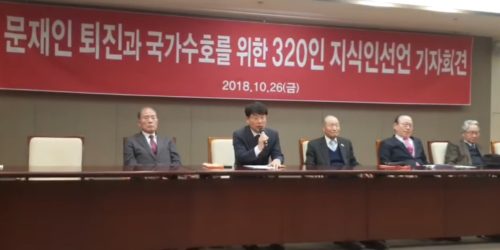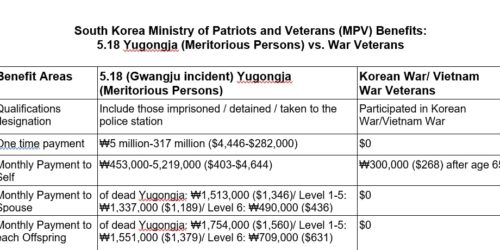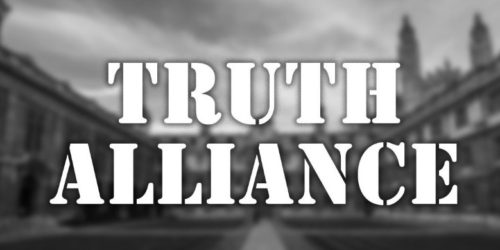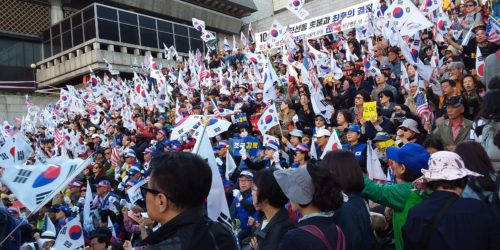Threat to Liberal Democracy in the Republic of Korea – An Insider’s Testimony
2018-10-12, Lee In-ho
SKF International Symposium
Threat to Liberal Democracy in the Republic of Korea
October 12, 2018, Washington, DC
Keynote address by Inho Lee, Professor Emerita, Seoul National University
(Former Chairwoman of KBS Board of Directors and Ambassador to Russia)
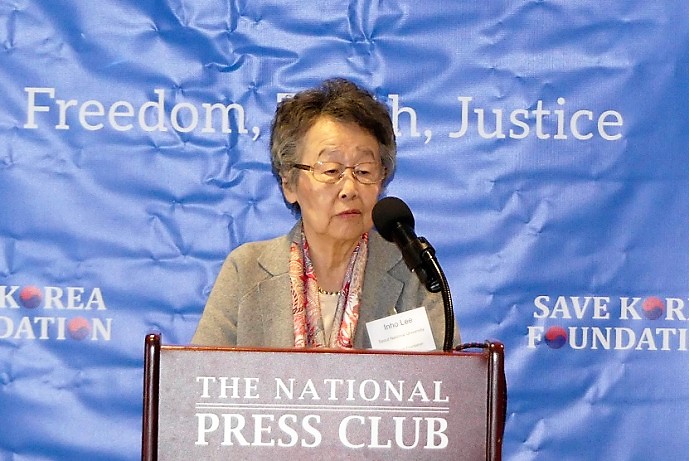
With attention focused on the threat posed by North Korea’s nuclear and missile development, the world seems to have forgotten the simple fact that North Korea was a problem state and a grave security threat, especially to South Korea, even before it had nuclear capabilities. In the flurry of excitement over summit meetings between old foes – the United States, North Korea and South Korea – almost totally overlooked also seem to be North Korea’s human rights issue and the Kim dynasty’s pattern of deceptive maneuvering and unreliability which that regime has demonstrated repeatedly in its international and inter-Korean dealings.
The most immediate victim of this strange amnesia, which seems to have gripped both the international community and South Korean voters alike, is the liberal democratic system of government on one hand, and the unity and national security of South Korea on the other. Changes which have overtaken Korea in the course of past year or two, though hardly noticed by outsiders, have been nothing less than revolutionary. The foundational belief in liberal democracy is badly shaken.
When the Republic of (South) Korea was founded in 1948, it was a crowning achievement of the liberal order, proof that an Asian country could adopt the same core beliefs as democracies in the West. That democratic system led to investments in technology, health, and education– particularly women’s education – which catapulted South Korea in record time to be one of the great Asian success stories. Now, in a strange reflection of what is taking place in many countries of Europe and even in the United States, those core democratic beliefs are being challenged by a new government preaching democracy but in reality systematically destroying that very democracy.
Mr. Moon Jae-in, elected president after the impeachment of President Park Geun-hye, openly denies the historical fact that the country of which he is President was launched as a liberal, democratic, anti-communist republic on August 15, 1948, with the support and blessing of the United Nations. The birth of the Republic of Korea, instead, is perceived by Moon and his core supporters not as an event to be remembered and celebrated but as an unfortunate, if not unforgivable, aberration resulting in the nation’s unnatural division. The fact that the Republic of Korea was born and developed as an anticommunist country has to be erased, not just from history as it naturally develops, but from established historical record and memory as well. Theirs is the old Stalinist approach to history as a powerful political weapon. This is why the controversy over history textbooks in Korea has been so acrimonious and even landed many people in prison.
The agreements reached in Pyongyang and, subsequently in Panmunjom by military leaders this September, were met with consternation by all defense experts and patriotic Korean citizens as a whole. With no mention of North Korea’s nuclear store, Moon and Kim agreed to create a no-fly zone along the north-south border, remove front-line guard posts and ban military exercises within 3 miles of the frontier, supposedly to reduce the risk of war. With 5000 odd long-range artillery pointing in the direction of Seoul, only 35 miles away, these agreements would fatally reduce Korea’s defense capability and give North Korea an obstacle free access to the capital city of Seoul.
Removal of American troops from Korea is an objective which North Korea has pursued for the past seventy years. Now that objective is within sight thanks to the help not just of outside agitators, but of South Korea’s own President. And amazingly enough, just as Moon was giving the North Korean leader a bear hug from the East, no less a figure than the President of the United States was hugging Kim from the West. One wonders if everyone has lost historical memory and sense of moral repugnance!
The lesson for North Korea is that the nuclear gambit has paid off handsomely. It would take an extreme optimist – or a moron – to expect Kim to be persuaded to give up his nuclear weapons at this critical juncture. The nukes and missiles, perfected in the face the United Nations economic sanction and at the expense of starving his toiling subjects, have proven to be not only the best guarantee of security for his regime but also a most effective tool for bargaining with America over South Korea. This of course was Kim’s intention all along. Kim is not foolish enough to think of risking a war with the United States. His voluntary spokesman, the South Korean President, said as much in his recent public confession in New York. But Kim knows that the threat of nuclear missiles reaching America can very well scare the Americans into giving up the Korean-American military alliance as the sudden about-face in President Trump’s attitude towards Kim indicates. Thanks to the Singapore summit, Kim Jong Un was suddenly elevated to the rank of top class world leaders in the eyes of Korea’s nationalistically oriented youngsters both in the North and the South.
The fear and admiration aroused by Kim’s perfection of nuclear weapons explains the sudden mood of enthusiastic support for President Moon’s notion of peace at any price. It also explains the strange failure to note the fundamental contradiction between the United Nations sanctions against North Korea and the sudden talk about signing a peace agreement as a way of inducing Kim to give up his nuclear program. Even a peace agreement, once signed, would remove politically any excuse for continued American presence in Korea to people immersed in Kim Il Sung’s juche (self-reliance) ideology.
There is something of a generational split in the attitudes of South Koreans. The older generation, with memories of the Korean War, feel a deep sense of insecurity and fear, even though Moon’s supporters both in Korea and abroad try to make the world believe that Koreans no longer need to worry about war and every Korean is jubilant about it. The pacifists attack their critics and skeptics as war-mongers or Koreans with no national pride or soul. But it is the older, conservative generation which is even more desirous of a swift and peaceful unification than its younger counterpart. They have little time to waste. The key question which disturbs them but not casual outside observers is “Under whose aegis and control will the unification process be managed?” “By whom and how will the cost of transition to the new regime of “One Korea” or two Koreas living with the border fully open be met?” These are crucial questions which have to be asked by anyone genuinely interested in peace when the two countries stand so far apart politically and economically. But they seem to be artfully ignored. Peace means not just the absence of military confrontation. There are values like freedom and independence without which peace has little meaning.
A sudden removal of the barrier between the two Koreas at this particular time point, many Koreans fear, would most likely result in South Korea being politically engulfed by North Korea rather than the other way around. President Moon totally misled the public when, questioned by the Fox reporter in his recent New York interview, he indignantly accused his critics of inconsistency and partisan prejudice, saying that they had been strong advocates of unification under President Park. In fact, Park’s dream envisioned unification as a “bonanza” to strengthen and enlarge the influence of the liberal democratic Republic so as to embrace the compatriots in the North, not to have it dwindle out of existence. Although South Korea still enjoys enormous economic superiority over the North, economic strength in itself is no safeguard against a political collapse. This is especially true when political power is in the hands of a man who is no believer in a free economy, as Moon’s treatment of the business leaders proves, and recognizes no enemy to the north of the demilitarized zone.
Domestic developments since the inauguration of President Moon have been even more disturbing and there is a ground to believe that South Korea is already headed in the direction of socialist, if not communist, one-party dictatorship. After having his predecessor impeached on alleged misuse of presidential power, Moon drew voter support with a campaign promise of downsizing the “imperial” presidency and bringing South Korea’s divided nation together by enhancing justice and equality. He promised to embrace even those who did not share his views. He won the highly controversial election by a plurality of only 41%. But as soon as he was inaugurated, demands put out by the most leftist and militant of his candle-light supporters, such as opposition to the deployment of THAAD and elimination of nuclear power plants, were dubbed the “Mandate of the Candle.” “Mandate of the Candle” then became the “Mandate of the People” and was given a most comprehensive political interpretation as a mandate to “Clean out all Accumulated Evils.” To some of us with longer memories, it was all ominously reminiscent of the Stalinist purges. The self-proclaimed mandate became a magic wand in President Moon’s hand: anyone who brushed against it has to be ready to face public ostracism, lose their job, go bankrupt, suffer endless investigation and litigation, and/or land in prison.
What has transpired in Korea in the past year or so show striking parallels to what happened in Russia after Lenin’s coming to power in Russia in October 1917. Lenin seized power in the name of the soviets, supposedly quintessential embodiments of grass root democracy. But it was the small group of Leninists, the Bolsheviks, who engineered the coup d’état. They did not reveal their true identity until all key posts in the new Soviet order were filled by their cohorts. Under President Moon, the campaign “to clean out all accumulated evils,” opened with the imprisonment of the ousted woman president together with key members of her Blue House staff. Targeted first were officials who had played a part in implementing the so-called “blacklist,” referring to the president’s effort to sort out of the government grant list some artists and writers, reputed to be particularly obnoxious. Then came the turn of those who had a hand in President Park’s policy to strengthen government control over history textbook writing.
A little over a year after Moon’s inauguration now, two former presidents are in prison with another, Chun Doo-whan, facing renewed investigation. They are joined by three former heads of Korea’s national security agency and countless other officials of the two previous administrations. Chief Justice of the Supreme Court Yang Seung-tae who was replaced by a key leader of the strongly leftist lawyers circle, “Korean Law Study Group,” is charged with having illegally lobbied Park’s Blue House, and had his former office searched by the Prosecutor’s office. The current Vice Speaker, a member of the opposition, has been accused of having illegally obtained his information because he exposed how much money Moon’s staff spent on food and shopping through their official expense account. He now faces pressure to resign from various National Assembly committees. Prominent people, whether they be business executives, generals, or media personages, are held up to social ostracism and face threats of prosecutors ransacking offices and homes for evidence. Such random and untoward social ostracism sometimes seems worse than outright legal charges.
With this “cleaning of all accumulated evils” proceeding at a galloping pace, Moon is tossing out public servants from major posts and filling them with his most trusted supporters. This is despite the fact that such posts, starting with presidents of the public media, KBS and MBC, have terms of appointment guaranteed by law. One may seriously dispute the moral and professional qualifications of the new candidates but it does not make the Blue House flinch so long as these are individuals securely anchored in the inner circle of Moon supporters. Meritocracy cannot hold where revolutionary cleansing is in order.
“Privatization” of the public sector, one may say, is proceeding in the name of people’s democracy. Never before in Korea’s history has the principle of the rule of law been so blatantly ignored and public positions so totally monopolized by a narrow circle of former dissidents. And the fear of becoming targeted in this whirlwind of purges is so pervasive that even lawmakers and the judiciary are rendered helpless. Should a few brave souls speak out in protest, no major media would carry their voices.
Not content with political purges, the new President embarked upon a fundamental revamping of the economic and social order –supposedly to remove and compensate for all economic and social inequities. First, Moon ordered a sudden halt to building three nuclear power plants which had been under construction already for three years, ignoring concerted objections of the astounded community of nuclear experts. They had made Korea’s nuclear reactor the world’s safest and most exportable, thereby contributing enormously to the export economy as well. Then the government introduced a new economic policy based on the concept of income-led growth. That will be achieved through a massive government subsidy to the economically disadvantaged, cutting down working hours and hiking the minimum wage, the Blue House economist Chang Ha-sung advocates. Skepticism and opposition, even from within the new government, or more recently, outcry from small and medium business people who are suffering from the foreseeable consequences of the ill-conceived reforms has not changed the President’s mind. Mr. Moon seems intent on drastically reordering an economy that has been the envy of Asia.
How, you might ask, was Mr. Moon able to achieve such radical changes without any effective resistance? Moon’s purges were acclaimed at first by the unsuspecting public because they were cleverly dressed up as parts of an anti-corruption, pro-human rights campaign directed at specific individuals deserving of punishment. Those who were able to detect through the anti-corruption veneer dangerous signs of subverting democracy and establishing a populist one-party dictatorship, were at first too stunned to act but soon it was fear which made people silent. Moral duplicity of the new government is becoming glaringly apparent as it freely violates the very same rules and regulations it made in order to debilitate its political foes. The most recent appointment as Minister of Education of a woman whose candidacy was rejected by the National Assembly because of her heavy record of criminal misdeeds is a case in point.
By the time Moon came to power in May, 2018, the Republic of Korea was a country more sharply divided than ever because of the recent impeachment affair. Those who had been appalled by the cheap sensationalism and moral nihilism of President Park’s impeachment proceedings suddenly discovered they had no media of their own. Whatever protests they launched were muted by the leftist dominated media, in alliance with the powerful National Federation of Democratic Labor Unions. A free press, one allowing many voices – a bulwark of democracy – had already been largely eroded. This requires some explanation to people not familiar with Korea’s modern history.
In Korea, because of the political and ideological division forced on the country in 1945, the role of the intelligentsia and public media has been much more critical in determining the nation’s fate than in countries enjoying higher degrees of political stability. On the surface, the Republic of Korea was a solidly anti-communist country. Until the collapse of communism in Russia and Eastern Europe, no one dared to question the liberal democratic foundation of the country standing face to face with North Korea. But underneath the surface, a relentless war of ideological propaganda and agitation, and the attempt to penetrate the other system with secret agents never stopped. President Park Chung-hee, the long-time dictator, who also was responsible for the economic miracle, made a fatal mistake. He countered the war of propaganda with a near total suppression of any real knowledge about communism and relied blindly upon stringent anti-communist security statutes. The result was an alienation of Korean intellectuals, leaving some of them predisposed to eagerly take in the leftist propaganda fed through dissident underground study circles.
Politically and morally, truth and justice were encapsulated in the simple formula: “Down with the (anti-communist right-wing) government!” Since they had little chance of becoming acquainted with communist systems through objective scholarly accounts, the intellectual and cultural community of Korea to this day remains woefully ignorant about the workings of communist systems. Nor, it might be argued, do the Korean people really understand the benefits and responsibilities of enlightened democracy. America and Syngman Rhee were regarded responsible for the tragic division of the Korean race and land, not the Soviet Union. In spite of its enormous superiority in economic strength the Republic of Korea was losing the war of propaganda and agitation to North Korea because of its inability to embrace critical intellect and inspire its educational and cultural community with genuine national pride and loyalty to the country.
Crucial to the political success of Mr. Moon was the media support he and the opposition as a whole had. After the so-called democratic spring of 1987, although on the surface the government (conservative) side was still in control of the two public broadcasting media, most of the producers and reporters at KBS and MBC were members of the leftist Media Labor Union, politically subordinate to the radical National Federation of Democratic Workers Unions. To crack down on what little was left of freedom of information and independence of the public media, and restructure them into sophisticated propaganda tools, Moon needed only to sit back and enjoy the red guard action readily undertaken by the radical media unions. To get rid of the CEO presidents and conservative board members appointed by the previous administration, these unions did not hesitate to use any means of pressure they could think of – from a threat to harm close acquaintances to outright violence. The ousted Board Chairman of MBC, a former prosecutor, was brought to trial for having called Moon a communist before he became President. When nothing worked, the labor union called in the help of the National Auditing Board to look into the already audited expense accounts of board members. The frightening campaign to “Clean All Accumulated Evils” was already terrorizing people into silence or hushed talks in all other sectors of life as well. The new president of MBC is a former producer famous for terrifying the people and thereby immobilizing the Lee Myong-bak government for over three months with a false report on the so-called mad cow disease connected to American beef. His counterpart at KBS now has launched a process of political purge by setting up the so-called “Truth and Future Committee.” At both KBS and MBC, broadcasters who had tried to remain neutral or supportive of President Park have been forced out or given menial jobs at both broadcasting giants.
Viewer ratings dropped sharply, reflecting the public disgust with these changes. People began to realize that no news or comment critical of the government ever gets broadcast, while important news-worthy events are ignored. But such critical reaction on the part of sensitive viewers does not change the fact that the Korean public, whether anti or pro Moon in their political leanings, has no reliable public media to act as their eyes, ears, and mouths. Even the privately-owned television channels are forced to tow the government line because they are dependent on the government for renewal of their broadcasting license.
With the demise of the public media as reliable sources of information, an anxious public is turning increasingly to the private internet channels. Although the left was first to exploit the political advantage of the internet, it is now the patriotic, not necessarily conservative side which for lack of other alternatives, crowds the broadcasting world of the internet. YouTube, because of its freedom so far from government interference, is the saving grace, providing a curious and anxious public with much-needed breathing space. PenNMike, an internet channel run by a former executive of the Korea Economy News, has become the central broadcasting tower for the conservative circles while many other anti-Moon programs vie for viewer attention and financial support.
Understandably, the Moon government together with leftist media like Hankyore are concerned with this phenomenon. A campaign to crack down on these internet rebels has already started, as well as various legislative projects to restrict free exchange of information even through smart phone routes such as the Korea-rooted “katok. ” On October 3, the prime minister himself appeared on television to announce government intention to “root out all false news.”
When seen against the background of these domestic developments in Korea, President Moon’s peacemaking efforts, acquire a different meaning. If liberal democracy is allowed to crumble down from within while the country’s fate as an independent political entity – indeed its very existence – is made to depend increasingly on the good will of Mr. Rocketman, one is right to wonder what is the meaning of “Korean peace.” Significantly enough, the leftist mayor of the Metropolitan City of Seoul recently awarded the first prize in a high-school essay competition to a jubilantly written paper entitled, “United Korea with Nuclear Weapons.”
Korea at this moment may be likened to a hijacked airplane. The passengers do not know yet that the pilot is a hijacker. They had welcomed him because he had nice smiles while the previous woman pilot was too serious and did not seem to like communicating with the passengers. Some passengers had strongly opposed the notion of changing the pilot mid-air, but could not dissuade the already excited crowd. Now many have begun to notice that the plane is moving in a strange direction, no longer headed for their home of freedom and prosperity. But those who brought in the new pilot shout down the concerned majority, threatening to lock them up, as they had done with the lady pilot. They are now flying to their brothers’ place, the hijackers say. There is a rocket and plenty of equality though not much freedom or food to share. The passengers, too scared to move now, sit there breathless, hoping against hope that the ground control may force the pilot to change direction. It appears, however, that the man in the control tower is of two minds.
I, for one, sincerely hope that the control tower realizes that once this sort of hijacking act is allowed to pass, however peacefully it might have begun, there will be no guarantee of safe travel for anyone. The hijacked plane, after picking up the brothers, could very well head for the control tower, where it might just crash land.
Finally, I call on the journalists here present to take interest in the radical socio-political change happening in South Korea. Given the inability or unwillingness of the Korean media to report on any news unfavorable to Moon and Kim Jong-un, your reporting of the issues and facts as they are, and not what Moon Jae-in and Kim Jong-un make them out to be, is so important in setting the course of the hijacked plane for a safe landing. Thank you so much for your attention.
